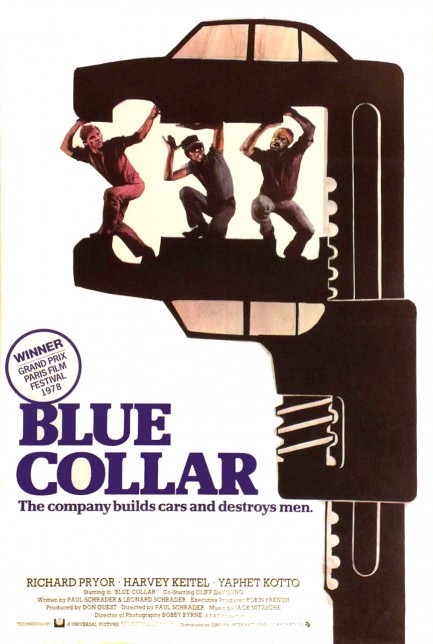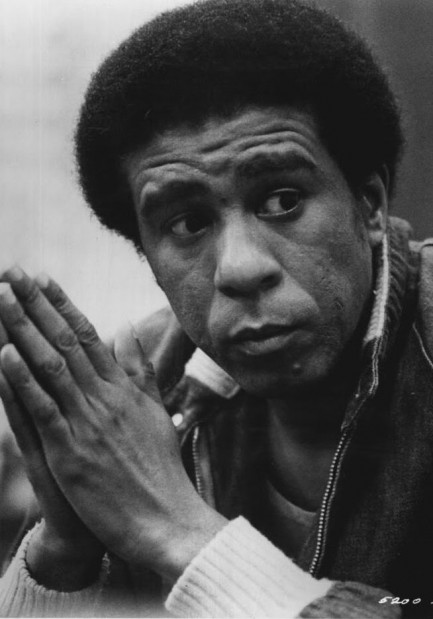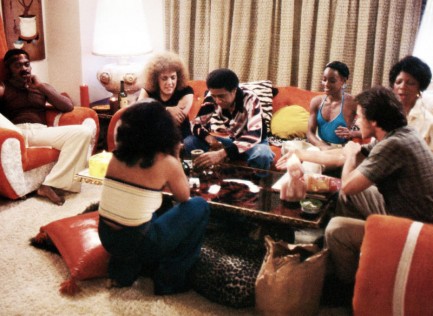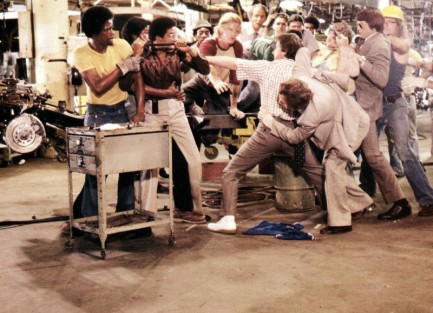| Vintage Pulp | Jan 27 2017 |

Just being able to survive feels like success.

Tonight the Noir City Film Festival is screening the urban drama Blue Collar, possibly the best film on the ten-day slate. Richard Pryor, Harvey Keitel, and the underrated but indispensable Yaphet Kotto star, but this is Pryor's show, his star turn. A trio of Detroit auto workers are driven by financial desperation to rob their own union hall. They end up netting three-hundred dollars. Trouble is the union, seeking insurance money, claims it was twenty thousand. The organized crime guy who backed the job isn't interested in stories about a three hundred dollar take—he's owed ten percent and that's two grand. But there's hope—the robbery also netted a notebook filled with information on illegal loans, and if Pryor and company can sell it maybe they can come out on top after all. But just how likely do you suppose that is?
 Blue Collar is a brilliant work of art. Cinematic maverick Paul Schrader directed it, operating in a gritty milieu that would become his trademark. But the pressurized lives of the working class heroes are truly brought to life by the cast. Keitel studied under Stella Adler and Lee Strasberg, as well as at the HB Studio, while Kotto is a guy who studied at the Actors Mobile Theater Studio and made his professional acting debut in Othello, but Pryor the stand-up comic outacted them both, using self-contained fury, razor sharp humor, and just the right amount of improvisation. The man was a once-in-lifetime talent. His comedy was fused with desperation and pain, but Hollywood tried to harness the funny Pryor and jettison the rest. It was like removing his heart. He truly shone only in serious films, where he would break high tension with moments of humanizing comedy. Blue Collar was the best of the lot.
Blue Collar is a brilliant work of art. Cinematic maverick Paul Schrader directed it, operating in a gritty milieu that would become his trademark. But the pressurized lives of the working class heroes are truly brought to life by the cast. Keitel studied under Stella Adler and Lee Strasberg, as well as at the HB Studio, while Kotto is a guy who studied at the Actors Mobile Theater Studio and made his professional acting debut in Othello, but Pryor the stand-up comic outacted them both, using self-contained fury, razor sharp humor, and just the right amount of improvisation. The man was a once-in-lifetime talent. His comedy was fused with desperation and pain, but Hollywood tried to harness the funny Pryor and jettison the rest. It was like removing his heart. He truly shone only in serious films, where he would break high tension with moments of humanizing comedy. Blue Collar was the best of the lot. By today's movie standards a couple of thousand dollars hardly seems like much to fret over. Audiences are used to crime films dealing with millions. But the small amounts here make the movie feel real. A 2016 study showed that half of adult Americans would not be able to come up with $400 in an emergency—they would have to sell something, borrow money, or not pay. Back in 1978, when Blue Collar was
 made, real wages in the U.S. were higher than they are now, so the movie depicts travails among working class people who were better off than working class people are today. Let that sink in. We think this is a perfect movie to show in San Francisco in 2017, a city overrun by tech workers contentedly pushing longtime residents out. The movie won't change anything in the city. But it will be remembered by the ticketholders at the screening.
made, real wages in the U.S. were higher than they are now, so the movie depicts travails among working class people who were better off than working class people are today. Let that sink in. We think this is a perfect movie to show in San Francisco in 2017, a city overrun by tech workers contentedly pushing longtime residents out. The movie won't change anything in the city. But it will be remembered by the ticketholders at the screening.

 made, real wages in the U.S. were higher than they are now, so the movie depicts travails among working class people who were better off than working class people are today. Let that sink in. We think this is a perfect movie to show in San Francisco in 2017, a city overrun by tech workers contentedly pushing longtime residents out. The movie won't change anything in the city. But it will be remembered by the ticketholders at the screening.
made, real wages in the U.S. were higher than they are now, so the movie depicts travails among working class people who were better off than working class people are today. Let that sink in. We think this is a perfect movie to show in San Francisco in 2017, a city overrun by tech workers contentedly pushing longtime residents out. The movie won't change anything in the city. But it will be remembered by the ticketholders at the screening.



































































